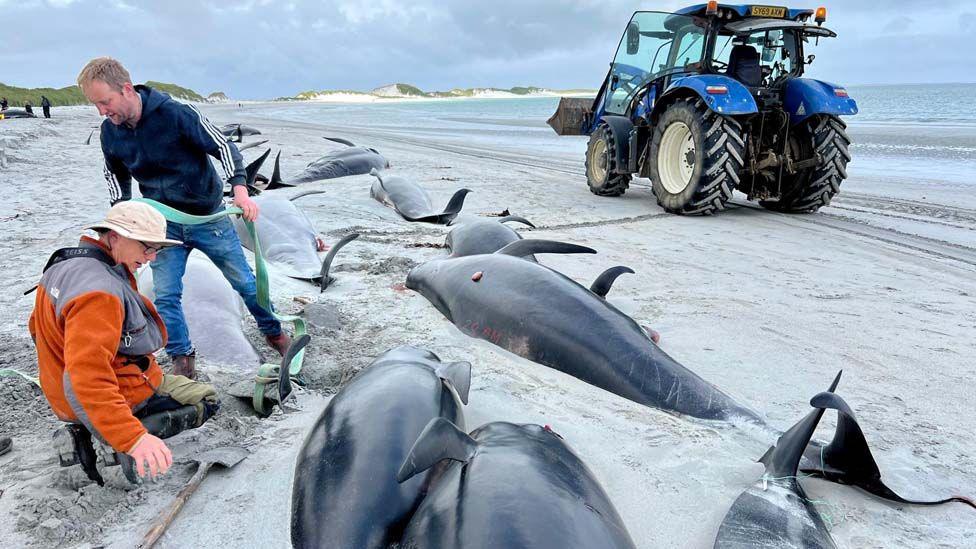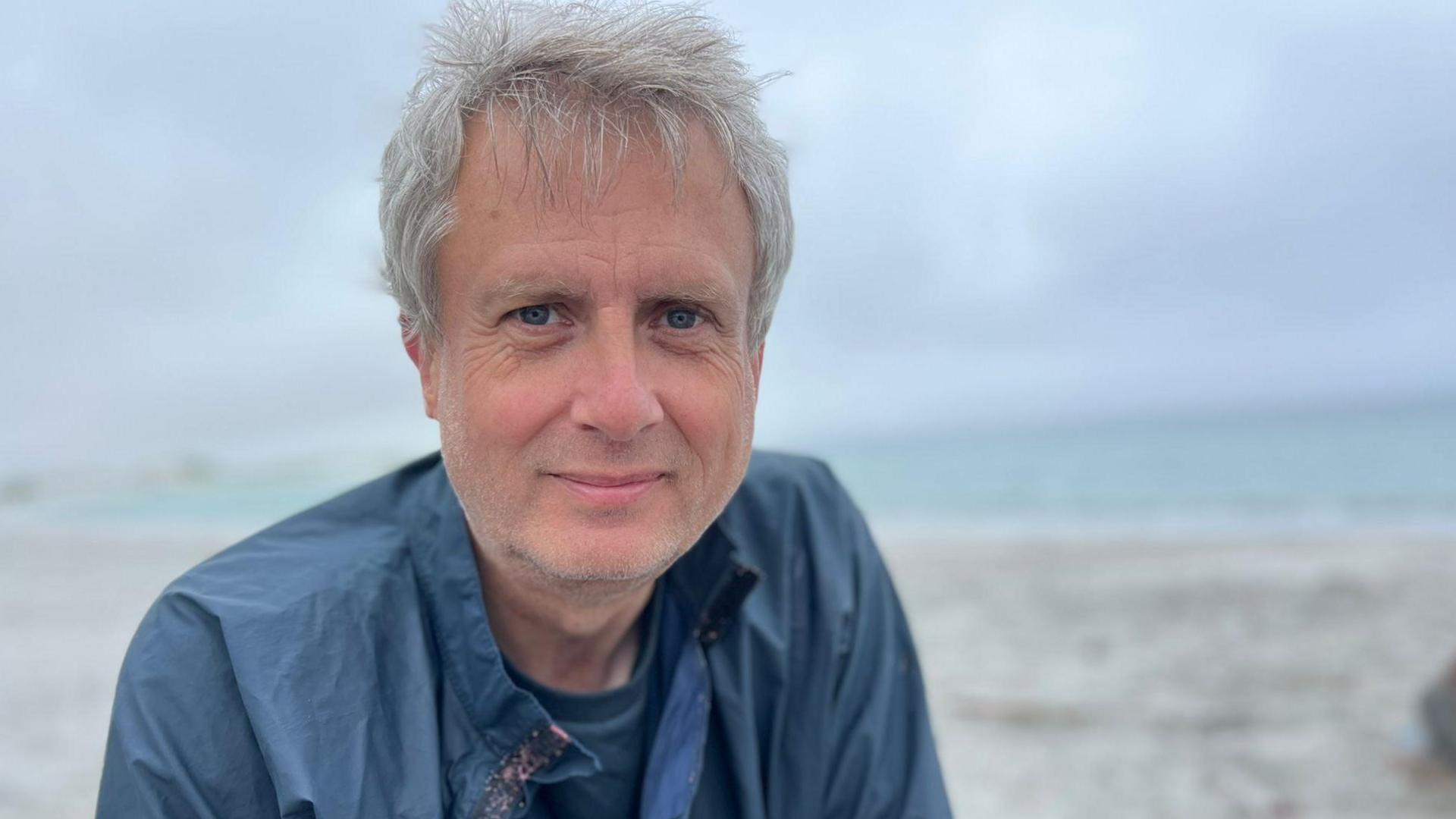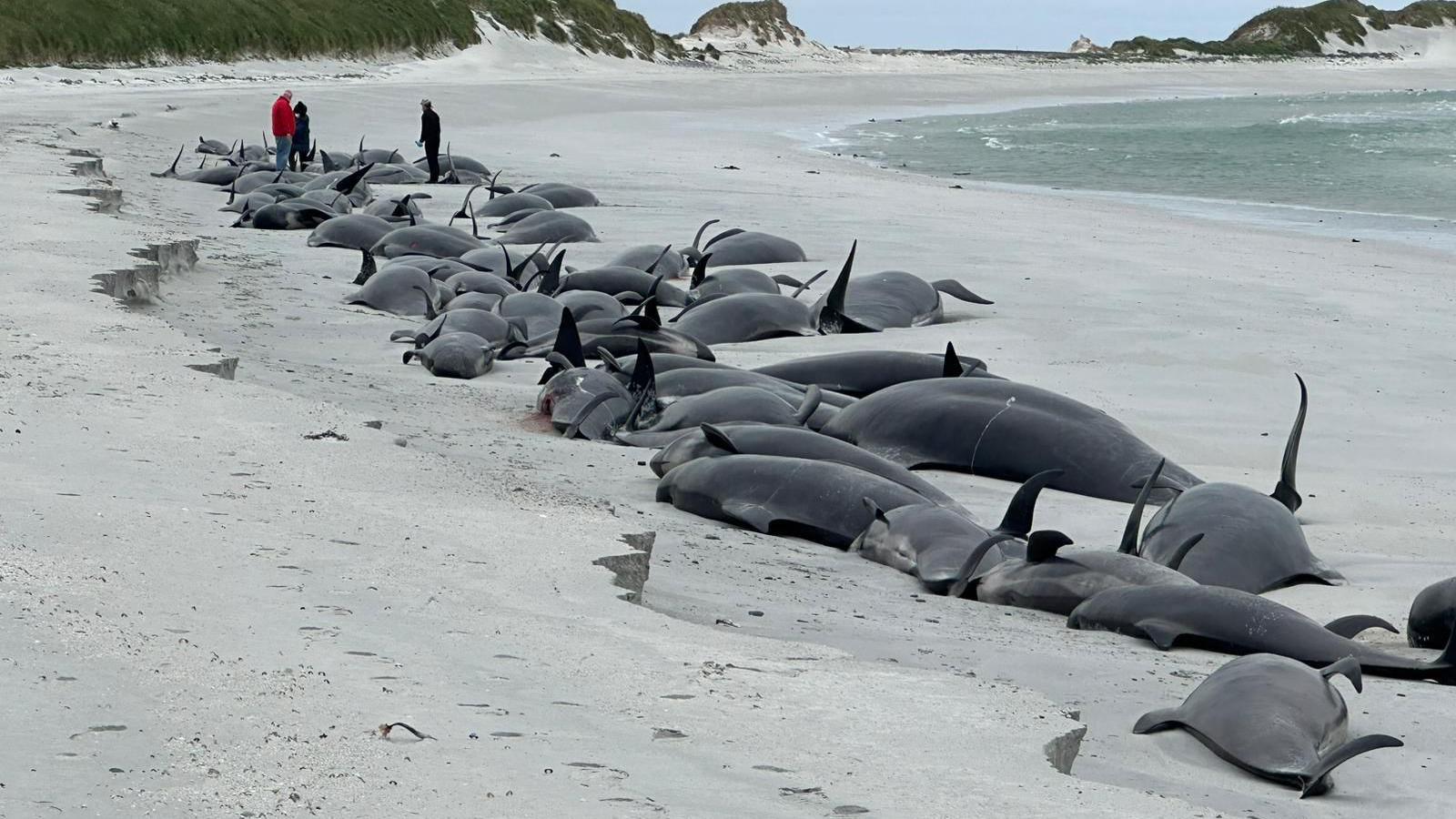Major operation to find cause of mass whale pod stranding
Experts arrive in Orkney to examine stranded whales
- Published
Experts from around the UK have arrived in Orkney to carry out examinations and post-mortems on pod of 77 pilot whales that died after washing ashore.
The animals were found on the island of Sanday on Thursday following what could be the largest mass stranding in nearly 100 years.
Cetacean specialists - whose expertise is in aquatic mammals - will use tissue samples to establish the cause of the stranding.
Nick Davison, stranding coordinator for the Scottish Marine Animals Stranding Scheme (SMASS), said the team have selected four female pilot whales to be examined in a post mortem.
Due to the scale of the stranding, these investigations will be carried out on some, not all, of the animals.
Members of the public are being asked to stay away from the area.

Work is continuing on the beach where the whales were stranded
Pilot whales are social creatures and live in a matriarch-style social structure, external with the oldest female seen as having the authority in the pod.
Mr Davison said by examining the females, the team can explore what may have caused the stranding and also learn more about how the whales lived.
He said: "It's often a process of elimination.
"Our aim here is really find out what's put them ashore, whether its disease or whether its something we’ve done."
Using samples taken from the whales, scientists can rule out disease, entanglements, ear damage from sonar and interaction with predators.
Mr Davison said the process of examining the whales could last three or four days.

Nick Davison from the Scottish Marine Animals Stranding Scheme is trying to establish the cause of the stranding
Emma Neave-Webb, of the British Divers Marine Life Rescue (BDMLR) charity, said removing the animals was a "massive undertaking".
She told BBC Radio's Good Morning Scotland programme that the investigations would be a "massive multi-agency undertaking".
The pod included male whales, measuring up to seven metres (22ft) long, as well as females, calves and juveniles.
Ms Neave-Webb said she felt helpless and emotional visiting the site and seeing the scale of the stranding.
She said: "I’ve seen this type of thing before through stranding's that have happened globally but I’ve never experienced it in person with that many animals lying on a beach.
"The animals were very closely packed together with alive animals next to dead animals - they were moving around quite a bit, thrashing their tails occasionally so it was a really dangerous situation."

BDMLR medics were brought in from mainland Orkney and Inverness to help with the rescue attempt, but Ms Neave-Webb said it appeared the whales had been stranded for "quite some time".
Rescuers attempted to keep the whales alive by pouring sea water over them, but the decision was later taken to euthanise them.
Following a high tide overnight, Ms Neave-Webb said some of the animals were now partially buried in sand, providing a further challenge to access them.
Scientists from the Zoological Society of London (ZSL) are expected to arrive in Orkney on Saturday to allow the team to carry out more examinations.
The site of the stranding is hard to access and Ms Neave-Webb paid tribute to Sanday locals who have provided transport using four by four vehicles.
"Everyone in the community and further afield have really pulled together to help." she said
"We’ve got a couple of the local farmers on standby with tractors and trailers to help us. They’ve been absolutely brilliant. They’re working with the council at the moment to organise where these animals are going to go."
Whole pod of 77 whales die in 'biggest mass stranding in decades'
- Published11 July 2024
How do you dispose of a whole pod of 77 whales?
- Published11 July 2024
A spokesperson for Orkney Islands Council said discussions were taking place with community representatives on how best to dispose of the bodies.
They said: "In previous circumstances where whales have beached on our shores and subsequently died, the approach from our Environmental Health team around disposing of the body has been to allow nature to take its course - with the public advised to stay away from the area.
"Our assessment in this case, given the scale and the likely public health implications, is that more definite action will need to be taken, for example burying them where they are or removing the bodies to a large grave site elsewhere."
BBC News understands Orkney Islands Council will make a decision on Saturday on how to handle the remains, with the "likely option" being burial.
The stranding is thought to be the largest UK stranding since 1927 when 126 out of more than 130 false killer whales died in the Dornoch Firth, external in the Highlands
Last year an entire pod of 55 pilot whales died following a stranding on Lewis.